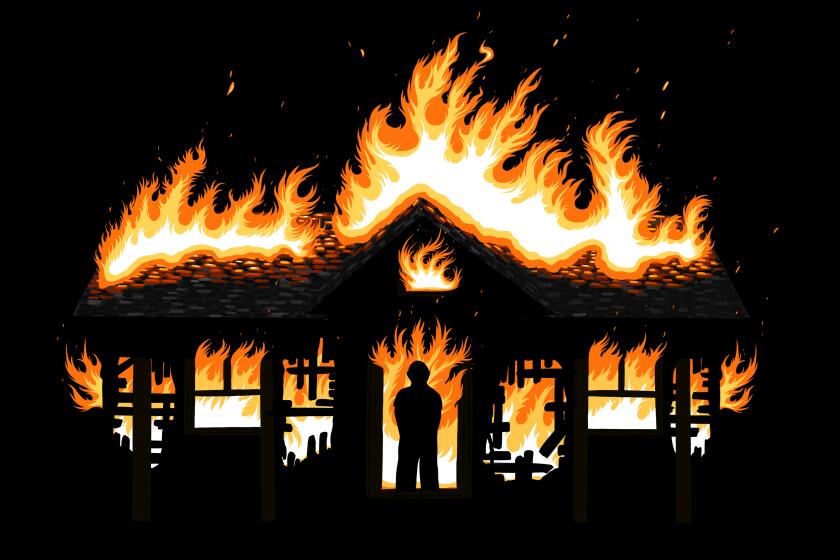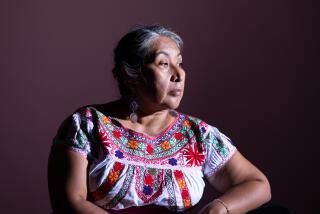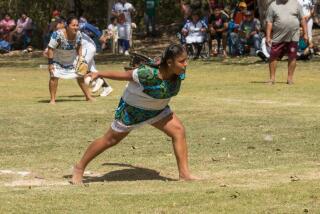
As El Tri fans cheered Mexicoâs CONCACAF Gold Cup win on Sunday outside SoFi Stadium in Inglewood, ESPN reporter JosĂ© del Valle approached a child and asked him in Spanish, âCual es tu nombre?â
âPorque gana Mexico? Por el Chaquito GimĂ©nez? Te gusto el tĂ©cnico? CĂłmo te sentĂs?â the reporter continued, asking a quick series of questions.
âMy name? What?â answered the child, who appeared startled by the reporter.
On the receiving end, you could hear anchors of the âFĂștbol Picanteâ show saying, âNo entiende. Es una generaciĂłn que ya no habla castellano.â
Learning Spanish wasnât part of a quest for identity. I was proud of this fact; that I was pursuing fluency on my own terms and not for cultural credibility.
Criticism quickly ensued across social media in reaction to the video, with commenters criticizing the childâs parents for not teaching him Spanish â âour heritage,â one person said on Twitter, adding, âThatâs a Latinos responsibility.â They lamented about a âmissed opportunityâ in not teaching the child Spanish at home. âRAISE YOUR KIDS NOT TO BE âYO NO SABO,â a man said in a viral tweet. Many others directly poked fun at the child.
But amid the backlash, many shared their own struggles in learning Spanish, especially if their parents worked a lot and if they didnât get to visit their home country often. One Twitter user said, âitâs about opportunity and family.â Others pointed out that for many people born in Mexico, âtheir first language is an Indigenous one.â Another mentioned their mother risking losing their job if they spoke Spanish, saying, âYou really donât know what our parents went through unless you ask.â
The Pew Research Center found that in 2021, 72% of Latinos ages 5 and older spoke English proficiently, up from 59% in 2000. U.S.-born Latinos drove this growth.
Meanwhile, the percentage of Latinos who speak Spanish at home declined from 78% in 2000 to 68% in 2021. Among the U.S.-born population, it has decreased from 66% to 55%.
For Jennifer NĂĄjera, an associate professor of ethnic studies at UC Riverside, the harsh reactions to the boy not knowing Spanish signaled âa very simplistic way of understanding the way language works.â
NĂĄjeraâs mother attended elementary school in Texas during the 1950s, a time when children would be punished for speaking Spanish. Her mother would be forced to skip recess if she were caught speaking the language. Sheâd have to spend it writing, âI will not speak Spanish. I will not speak Spanish.â Sometimes, students would tell on other classmates who were heard speaking Spanish, NĂĄjera said.
A once-segregated Mexican American school in Texas may become a historic site.
Due to this stigma, NĂĄjeraâs mother âmade a point to speak to us in English,â she said. âIt was very important for her [that] we speak English well, that we not speak with accents.â
NĂĄjera picked up some Spanish words, hearing her parents speak it to each other or with their siblings, but she acknowledged growing up as a âyo no saboâ kid. It wasnât until college that she realized how normal it was for the third generation to be monolingual English speakers.
She studied abroad in university and minored in Spanish.
âI did everything I could to learn how to speak Spanish because it was important to me. But, if you are not surrounded by the language, if you are not raised in the language, then itâs really difficult to be to be a fluent Spanish speaker,â she said.
Now, NĂĄjera is fluent enough to communicate in Spanish, but itâs still difficult passing on the language to her children. Admission to Spanish-language immersion programs in her area are lottery-based and English was the dominant language in day care. While she speaks Spanish, âthe way I express my affection ... and the language I would speak to my kids that feels most natural was English.â
Language and culture are intertwined, and many Latino Americans are seeking to learn or improve their Spanish to form deeper connections with family and their own identities.
Seeing the boy celebrating El Triâs win at SoFi Stadium in community with others, NĂĄjera said, âheâs still hanging on to his Mexican culture.â
âLanguage isnât the only thing that defines who we are and our relationship to our Mexican heritage,â she said.
Wendy Ramirez and Jackie Rodriguez, who co-founded Spanish Sin Pena â a safe space where adults can learn Spanish at their own pace â agree.
They attended the Mexico match on Sunday and saw the viral video the next morning. The hateful reactions toward the child were hurtful and painful, they said.
âI see myself in him, as someone who has always been called a gringa or a pocha,â Rodriguez said.
Being at the game, Rodriguez acknowledged she wouldnât be able to fully explain the technicality of the game in Spanish or give you every single playerâs name, but she added, âNot knowing the language canât take that sense of community ... canât take that excitement and fun.â
âWe are enough already, right where we are, and the language doesnât make us any more or less than,â she added.
Ramirez said more people are becoming aware of the discrimination and forced assimilation that earlier generations faced in the U.S., but acknowledged there are still assumptions that must be challenged.
âAre you expecting someone, because of how they look, because theyâre wearing a Mexico jersey and their skin is brown, that they speak castellano?â Ramirez said.
Ramirezâs first language was Spanish, but said she spoke it less as she got older.
âOur language is beautiful, and we should teach it to the next generation, but understand that it evolves,â she said. ... There needs to be more understanding and compassion.â
More to Read
The Latinx experience chronicled
Get the Latinx Files newsletter for stories that capture the multitudes within our communities.
You may occasionally receive promotional content from the Los Angeles Times.











